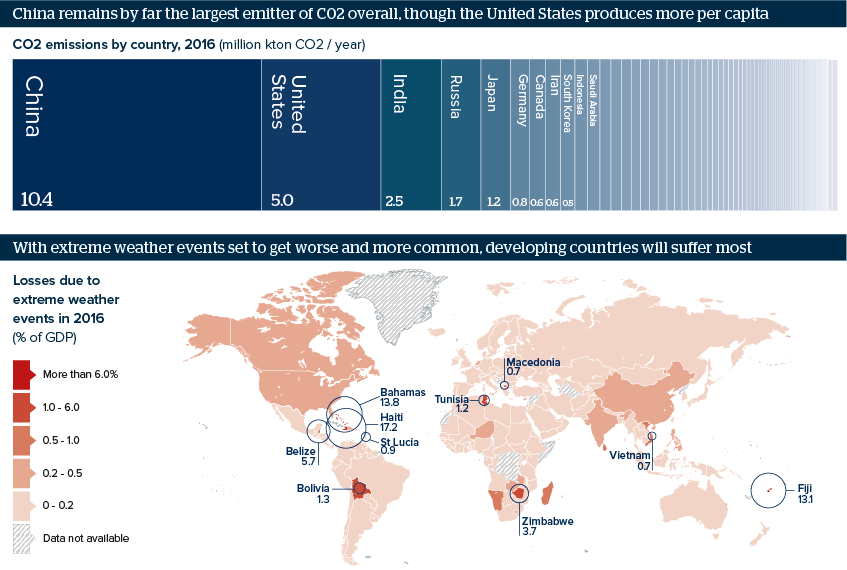Climate change reversal technology is no magic bullet
Climate change looks set to have catastrophic effects if drastic action is not taken to reduce global carbon emissions
Source: UN IPCC; Emissions Database for Global Atmospheric Research (EDGAR); Germanwatch Global Climate Risk Index 2018
Outlook
A UN Intergovernmental Panel on Climate Change (IPCC) report has warned the consequences of exceeding the Paris Agreement’s 1.5-degree Celsius global-temperature-rise limit will be far worse than previously imagined.
Ending carbon emissions, and forest restoration on an unprecedented scale, would go a long way towards preventing irreversible environmental damage but such solutions will hit staunch political resistance.
Negative emissions technologies will be more attractive for governments and are likely to play a major role, but they are under researched, underdeveloped and will require dramatic advances before they can feasibly have any real impact. With governments likely to pursue technological fixes, research and development funding will increase, bringing hope for solutions, but also complacency.
Impacts
- The avoidance of catastrophic climate damage remains possible but, requiring such a massive, concerted international effort, looks unlikely.
- Climate change-related issues such as water scarcity and food insecurity will become major drivers of conflict this century.
- States’ need for quick fixes may make drastic, possibly damaging tech, such as solar radiation management geoengineering, more attractive.
See also
- Report to boost climate action calls globally - Aug 27, 2021
- COVID-19 global climate impact may be brief - Mar 27, 2020
- International green bond market set to strengthen - Sep 9, 2019
- Nature-based climate solutions to grow globally - Jul 19, 2019
- Private sector climate change efforts are insufficient - May 24, 2019
- UN report increases pressure for climate action - Mar 29, 2019
- Global climate protests will become more frequent - Mar 18, 2019
- Glacier melt poses multiple threats around the world - Mar 7, 2019
- Maghreb’s water scarcity may foment unrest - Jan 31, 2019
- Utilities will reform to cope with climate change - Jan 29, 2019
- COP 24 leaves much to be done regarding climate change - Dec 18, 2018
- Prospects for climate governance in 2019-23 - Dec 4, 2018
- Climate change impacts will worsen in Latin America - Nov 14, 2018
- Interest in carbon markets will rise globally - Nov 1, 2018
- Paris Agreement climate goals face new scrutiny - May 4, 2018
- More graphic analysis
